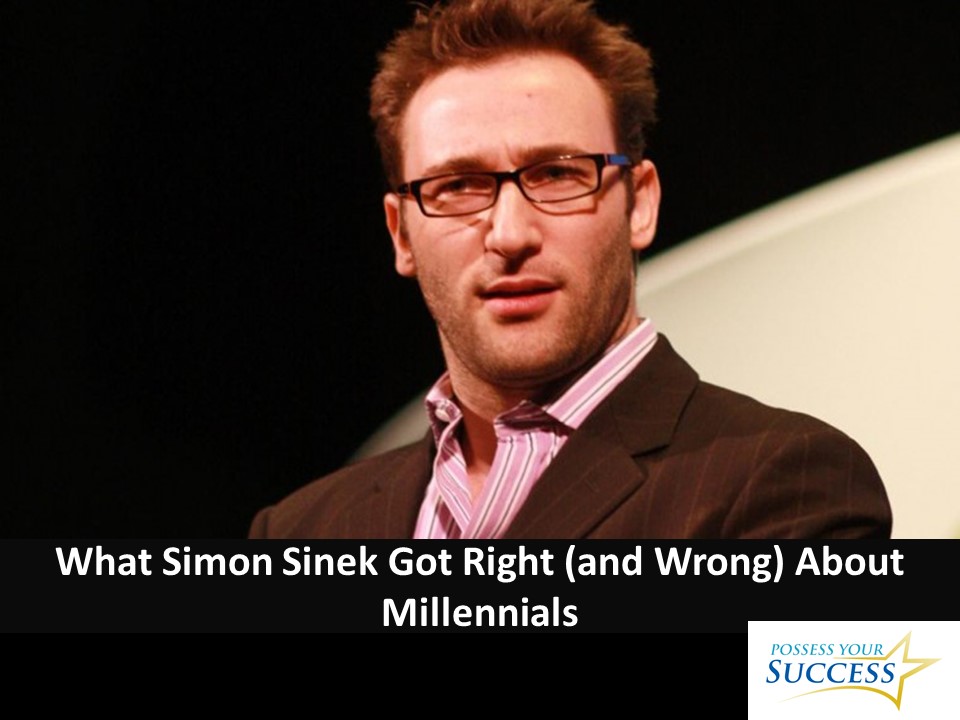What Simon Sinek Got Right (and Wrong) About Millennials

Do you feel Millennials in the workplace get a bad rap when it comes to entitlement or work ethic? Or do you feel it’s rightly justified based on your experience?
Well, either way you’re going to want to read this post.
Simon Sinek–famous author, speaker, and the one who popularized the “start with why” concept of finding your purpose–is at it again with his latest viral video. In this one, he discusses the conundrum that is the workplace Millennial and if how corporations can keep them fulfilled enough to stick around.
Honestly, as a Millennial it was hard to watch the first time. Broad, sweeping generalizations about your generation are never easy to swallow. However, on the second pass, it was much easier to form an opinion on whether Sinek was spot-on, or completely off-base with his analysis.
Thus, I created this response on what Sinek got right (and wrong) about Millennials.
Essentially, Sinek explains that Millennials are seen as lazy, narcissistic, and entitled. We want to make an impact on the world, but we’re unwilling to put in the work to back it up. I agree to some extent. It’s sad, but this participation-trophy, no-child-left-behind approach to life has led to a lack of sense of accomplishment for many of us, and an unjustified sense of accomplishment for the rest.
The reason us Millennials “got this way”? According to Sinek, there were 4 major paradigms we can blame (the PETI paradigms, as I call it):
– Parenting: The “you’re special” approach
– Environment: The physical and emotional environment we grew up in
– Technology: The technological advances we’ve adopted
– Immediacy: The “Same-Day Shipping” mentality
Because of these factors, we sound like we have it all figured out when we really don’t, and when we get to the real world, we just can’t handle it. What’s worse, because of social media, we were never taught how to make the deep, meaningful relationships with others necessary to work together in the corporate world.
This totally makes sense. A lot of Millennials these days complain about how hard Adulting is. Duh! It’s tough out here! That’s why it’s so important that we have our expectations set appropriately and we are allowed to develop valuable skills like discipline and grit.
On the other hand, there are some points that completely rang hollow. First of all, I think there is such a thing as a healthy sense of entitlement.
What I mean is that we should all expect more out of ourselves and others, provided that we all put in the work. The whole rationale behind my business, Possess Your Success, is that we are entitled to our own vision of success; we just need to take the necessary actions to make that vision a reality. Many Millennials are simply lacking in the “effort” department.
Second, I’m sorry Simon, but each and every one of us is special, Millennial or otherwise. We all have different traits, personalities, and experiences that make us completely unique. And I don’t think there’s anything wrong with that, or being told that.
However, once people begin thinking they’re more special than anyone else, that’s where we get into trouble. Us Millennials must be aware of that, because it is very easy for things like social media and our inner circle to make us feel like we’re more important than the next person.
Finally, us Millennials in the workplace must take responsibility for ourselves and our own lives. It would be great if companies want to teach us social and interpersonal skills, but first we must demand more of ourselves. We need to WANT to be better friends, better co-workers, and better people. Without accountability and buy-in on our part, it really doesn’t matter what companies provide us.
I really appreciate Sinek for providing valuable insight into what we didn’t know (and some of the things we secretly did know) about such a seemingly bewildering generation. It may not have been 100% our fault for why we are the way we are.
However, now that we know why, it’s our responsibility to take the necessary actions to succeed in the corporate world–and in life.
